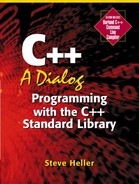U
An uninitialized variable is one that has never been set to a known value. Attempting to use such a variable is a logical error that can cause a program to act very oddly.
An unqualified name is a reference to a member variable that doesn't specify which object the member variable belongs to. When we use an unqualified name in a member function, the compiler assumes that the object we are referring to is the object for which that member function has been called.
An unsigned char is a type of integer variable. See char for details.
An unsigned int is a type of integer variable.[4] See int for details.
[4] You can also declare such a variable as unsigned without a size specifier.
An unsigned long is a type of integer variable. See long for details.
An unsigned short is a type of integer variable. See short for details.
An unsigned variable is an integer variable that represents only positive values (and 0). See char, short, int, and long for details.
The term user has several meanings in programming. The primary usage in this book is application programmer; however, it can also mean library designer (in the phrase user-defined data type) or even end user.
A user-defined data type is one that is defined by the user. In this context, user means “someone using language facilities to extend the range of variable types in the language”, or library designer. The primary mechanism for defining a user-defined type is the class.
A using declaration tells the compiler to import one or more names from a particular namespace into the current namespace. This allows the use of such names without having to explicitly specify the namespace from which they come.
